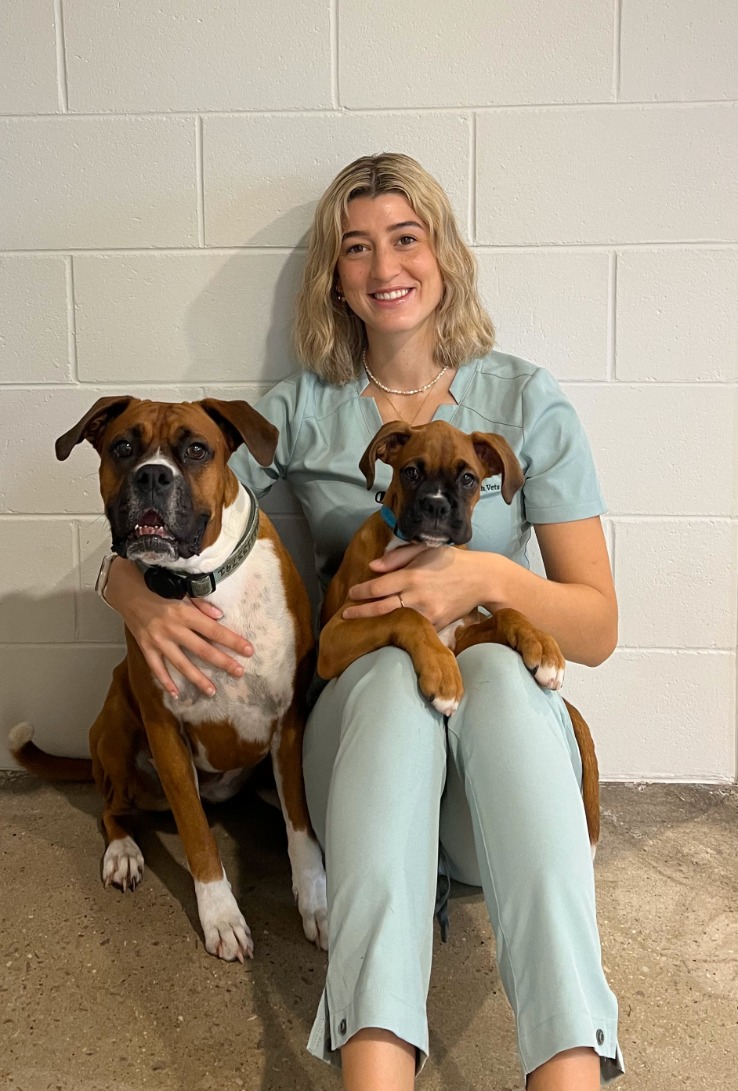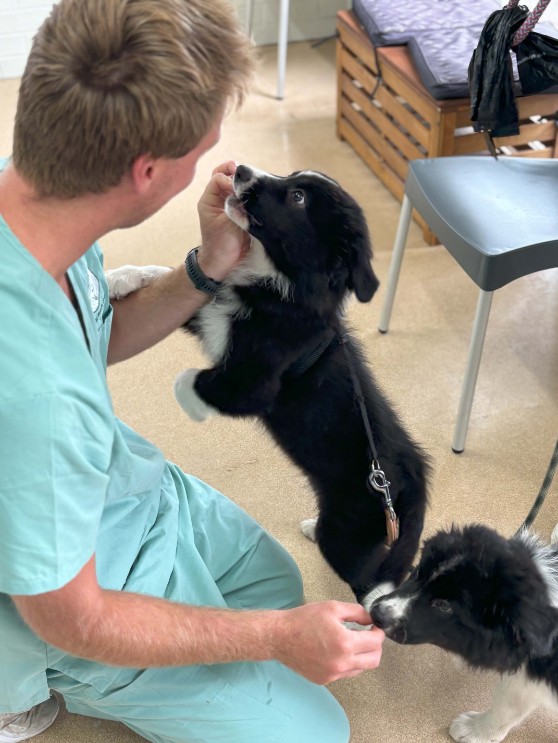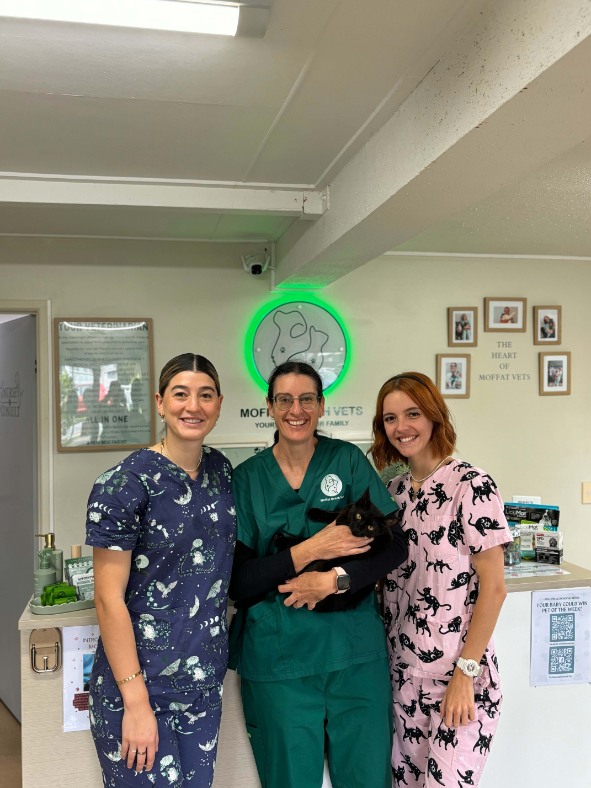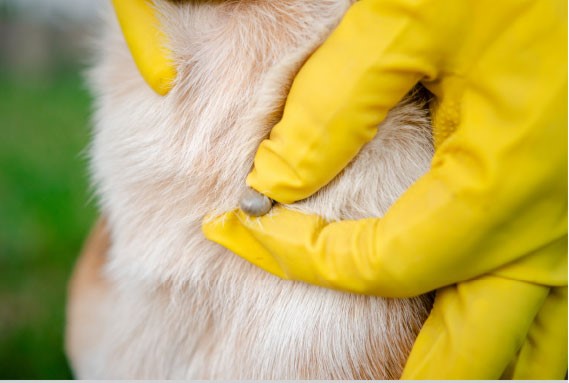Dog Parasite Prevention
We offer parasite control strategies to keep your dog safe and comfortable all year round.

Trustindex verifies that the original source of the review is Google. Always greeted with a warm welcome, vets and nurses are all so kind and caringTrustindex verifies that the original source of the review is Google. One of the best and caring vets I've been to.Trustindex verifies that the original source of the review is Google. They helped bring a little comfort and kindness during an otherwise heartbreaking time.Trustindex verifies that the original source of the review is Google. These ladies (and Tim!) are the best in the business in my opinion. They were so patient and loving with my boy Marvin, they were helpful and answered any and all questions I had. He was spoilt rotten with cuddles and treats and I can bet he is excited for his next visit already. Thank you to the Moffat Beach Vets team!!Trustindex verifies that the original source of the review is Google. My first visit to your Veterinary Practice where I registered my little dog Georgie Girl. It was a wonderful experience. Dr Belinda who examined Georgie was amazing and suggested a number of things that may help towards Georgie 's wellbeing. I would have no hesitation in recommending Dr Belinda at Moffat Beach Vets to my friends. She was so easy to talk to and Georgie was so relaxed when she was examined, which is normally unusual for her. The Vet Nurse Taylor was also very friendly and helpful. I would definitely let all my friends know about Moffat Beach Vets.Trustindex verifies that the original source of the review is Google. Brilliant and super friendly and helpfulTrustindex verifies that the original source of the review is Google. All staff are welcoming and knowledgeable!! They make it so easier for me to book my pet in around work schedules which I appreciate!! Staff are always happy to see you and conversations are so easy!Trustindex verifies that the original source of the review is Google. My fur baby Bella who is a rescue hates anyone thats breathing an warm red blood running through their veins. I'm not joking. Thanks to the wonderful staff they can not only wash her but clip her nails. I have 3 fur babies an I never have to drag them in there. Powderpuff actually runs in there to greet them. The first 2 months of taking Bella to get groomed they call me to say they can't get her to come out of the cage. I kept taking her there an they finally won her over.Verified by TrustindexTrustindex verified badge is the Universal Symbol of Trust. Only the greatest companies can get the verified badge who has a review score above 4.5, based on customer reviews over the past 12 months. Read more
Parasite Prevention Plans for Dogs
Keep your dog safe with a parasite prevention plan that includes regular treatments for fleas, ticks, heartworms, and intestinal worms. Our goal is to ensure your dog stays happy, healthy, and free from unwanted pests.

Common Dog Parasites We Help Prevent

Fleas

Ticks

Worms

Ear Mites
Did you know?
Even the smallest pests can cause serious discomfort or disease in your dog. That’s why we recommend a proactive, year-round approach to protecting against all dog parasites.
Prevent parasites like fleas, ticks, heartworms, and intestinal worms from becoming a nuisance or a serious health problem for your pup. Contact us today.
Treatment for All Types of Dog Parasites
Internal Parasites
Heartworms are internal parasites. Heartworms are transmitted from one dog to another by mosquitoes, which pick up tiny microfilariae when they bite an infected dog. The heartworm larvae then migrate through the dog’s tissues and circulatory system, eventually reaching the heart and lungs.
Treatments for Internal Parasites:
- Heartgard
- Simparica
- Nexgard
- Interceptor
Intestinal Parasites
Hookworm, tapeworm, whipworm, and roundworm are intestinal parasites. Puppies are often the most susceptible to worm infestation. Intestinal worms are spread via dog faeces, so can be picked up anywhere from the backyard to the dog park.
Treatments for Intestinal Parasites:
- Paragard
- Simparica
External Parasites
Fleas, ticks, and ear mites are external parasites. The most common way dogs pick up external parasites is from the environment: a walk, the dog park, the beach, or even your backyard.
Treatments for External Parasites:
- Bravecto Quantum
- Simparica
- Otoflush
- Cytopoint
Calm Visits With Our Fear Free Approach
At our veterinary clinic, you’ll be fully supported with sound advice for your dog.
As part of our service, we help you understand the health care and treatment options available to your canine, even those that can be implemented before or after your visit to calm your pet. Ask our team about this today!
With good advice and professional recommendations, you’ll be well equipped to make the best health care decisions for your pet.
What to Expect from Our Clinic


Prompt Service
We work with you and your schedule to get your dog the care they need, when they need it.

Fear Free Approach
To ensure your pup has an anxiety free visit to our clinic, we offer a range of methods and practices to help keep them feeling calm and safe.

Caring Staff
If your dog gets sick overnight but you still need to work in the morning, drop them off with us. Our vets will assess and care for them between regularly scheduled appointments.
Tick Control
The most common ticks infesting dogs in Australia are the paralysis tick, the brown dog tick, and the bush tick. To prevent these:
- Use effective tick control products year-round.
- Search your dog daily for ticks – although tick control products will greatly reduce the risk of tick paralysis, it only takes one tick to cause tick paralysis.
- Reduce exposure to ticks in the environment (e.g. clean up leaf litter and debris, minimise or restrict your pet’s access to bushy environments).
- If you find a tick, remove it immediately, and seek veterinary attention
We’re more than happy to show you how to do a thorough tick search and recommend appropriate tick control products for your dog.


Flea Control
The most common way dogs pick up fleas is from the environment. Fleas rarely jump from pet to pet. Pets can pick up fleas from a walk, playing in the dog park, at the beach or even in the backyard.
Spotting fleas isn’t always easy – they are small and fast, and some dogs can show signs of severe itchiness and irritation when only a few fleas are present.
It’s important to remember that fleas aren’t just a problem in the summer. Use flea control all-year-round. You, and your pup, will be happier for it.
Intestinal Worm Prevention
Intestinal worms are relatively common in many animal species including dogs. Regular deworming is essential to ensure your pets remain healthy and to reduce the risk of some of these worms being transmitted to people.
- Roundworms
- Tapeworms
- Hookworms
- Whipworms
Worms can be transferred from dogs to humans so routine deworming reduces the chance of exposure.


Heartworm Prevention
Heartworms are transferred to dogs by mosquitoes. These internal parasites may cause no clinical signs in the early stages of infestation, but as the worms grow and mature, they can interfere with the normal circulation of blood. This can result in signs of heart failure, and in some cases may lead to sudden death.
Thankfully, heartworm is very easy to prevent and should form part of your pet health care routine.
If your pet has not been on heartworm prevention we strongly recommend you speak to us about a heartworm test prior to starting a prevention program.
Please call us to discuss the best heartworm prevention program for your pet.
Common Questions About Dog Parasites
Everything you need to know about canine parasite control. Can’t find an answer? Contact our team.
What are the most common parasites in dogs?
Fleas, ticks (including paralysis ticks), intestinal worms (like hookworms, roundworms, and tapeworms), and heartworm are the most common parasites we see in dogs on the Sunshine Coast.
How do I tell if my dog has a parasite?
Common signs include itching or scratching, scooting, vomiting, diarrhoea, bloated belly, coughing (in the case of heartworm), weight loss, or visible worms in the stool.
If you’re unsure, we’re happy to check your dog and recommend the right treatment.
Can dog parasites infect humans?
Yes, some parasites can be transmitted to humans, especially through close contact or contaminated environments.
Regular parasite prevention protects your pet—and your household.
Will a dog parasite do away on its own?
Not usually. Parasites often multiply and cause more severe symptoms over time. Prompt treatment is the best way to protect your dog’s health and prevent the spread of infection.
What are symptoms of parasites?
Symptoms can vary but often include:
• Itching or scratching
• Scooting
• Vomiting or diarrhoea
• Weight loss
• Lethargy
• Visible worms or segments in stool
• Coughing or difficulty breathing (heartworm)
If your dog shows any of these, contact Moffat Beach Vets for advice or an appointment.



